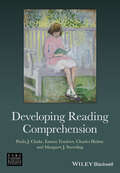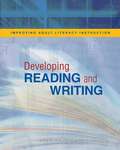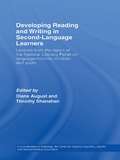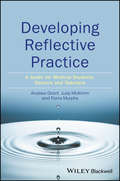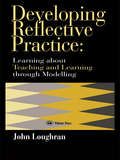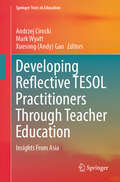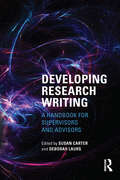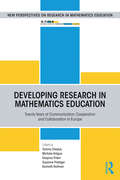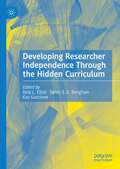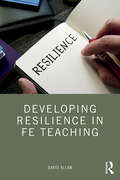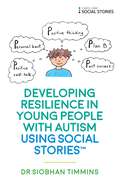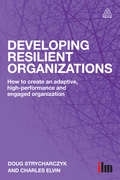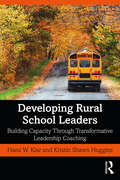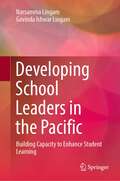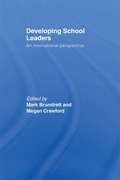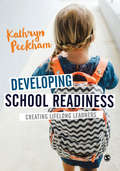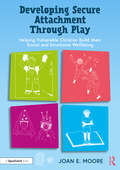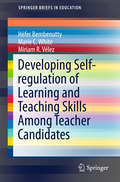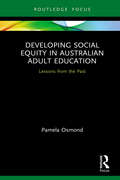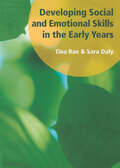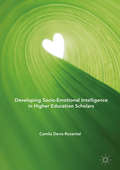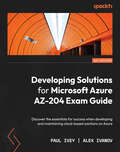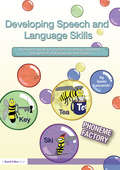- Table View
- List View
Developing Reading Comprehension
by Charles Hulme Emma Truelove Margaret J. Snowling Paula J. ClarkePresents cutting-edge, evidence-based interventions for dealing with specific difficulties of reading comprehension in children aged 7-11. An in-depth introduction to the ‘poor comprehender profile’, which describes children who despite being fluent readers have difficulty extracting meaning from text. Sets out a range of practical interventions for improving reading skills in this group - along with comprehensive guidance on assessment and monitoring, and insightful accounts of professionals’ experience in delivering the techniques described. Includes an overview of psychological theories of reading comprehension, evaluating their practical applicability.
Developing Reading and Writing
by M. ChiangMore than an estimated 90 million adults in the United States lack the literacy skills needed for fully productive and secure lives. The effects of this shortfall are many: Adults with low literacy have lower rates of participation in the labor force and lower earnings when they do have jobs, for example. They are less able to understand and use health information. And they are less likely to read to their children, which may slow their children's own literacy development. At the request of the U. S. Department of Education, the National Research Council convened a committee of experts from many disciplines to synthesize research on literacy and learning in order to improve instruction for those served in adult education in the U. S. The committee's report, Improving Adult Literacy Instruction: Options for Practice and Research, recommends a program of research and innovation to gain a better understanding of adult literacy learners, improve instruction, and create the supports adults need for learning and achievement. Improving Adult Literacy Instruction: Developing Reading and Writing, which is based on the report, presents an overview of what is known about how literacy develops the component skills of reading and writing, and the practices that are effective for developing them. It also describes principles of reading and writing instruction that can guide those who design and administer programs or courses to improve adult literacy skills. Although this is not intended as a "how to" manual for instructors, teachers may also find the information presented here to be helpful as they plan and deliver instruction.
Developing Reading and Writing in Second-Language Learners: Lessons from the Report of the National Literacy Panel on Language-Minority Children and Youth. Published by Routledge for the American Association of Colleges for Teacher Education
by Timothy Shanahan Diane AugustA Co-Publication of Routledge, the Center for Applied Linguistics, and the International Reading Association This book is a shorter version of Developing Literacy in Second-Language Learners, reporting the findings of the National Literacy Panel on Language-Minority Children and Youth. This book concisely summarizes what is known from empirical research about the development of literacy in language-minority children and youth, including development, environment, instruction, and assessment. This more accessible version of the full report is intended for teachers, administrators, and researchers and for use in a wide range of teacher preparation courses and in inservice/ staff development programs that deal with educating English language learners. Visit www.reading.org for more information about IRA books, membership, and other services. Visit www.cal.org to learn more about the Center for Applied Linguistics.
Developing Reflective Practice: A Guide for Medical Students, Doctors and Teachers
by Judy Mckimm Fiona Murphy Andy GrantThe ability to reflect on practice is a fundamental component of effective medical practice. In a sector increasingly focused on professionalism and patient-centred care, Developing Reflective Practice is a timely publication providing practical guidance on how to acquire the reflective skills necessary to become a successful clinician. This new title draws from a wide range of theoretical and practical multidisciplinary perspectives to assist students, practitioners and educators in embedding reflection in everyday activities. It also offers structures and ideas for more purposeful and meaningful formal reflections and professional development. Developing Reflective Practice: Focuses on the developing practitioner and their lifelong learning and the development of professional identity through reflection Provides practical how-to information for students, practitioners and educators, including realistic case examples and practice-based hints and tips Examines and explains the theoretical and conceptual approaches to reflective practice, including its models and frameworks.
Developing Reflective Practice: Learning About Teaching And Learning Through Modelling
by J. John LoughranThis text presents a research study into the development of reflective practitioners in a pre-service teacher education programme. The teacher educator in the study modelled his own reflections on practice in the hope that it would help students to apply reflection to their own teaching.; The results of the author's research demonstrate that reflection on practice occurs in three distinct periods: before anticipatory, during contemporaneous and after retrospective a pedagogical experience. The book concludes that when student teachers' own learning situations, both within their university coursework and their school experiences, become the focus for their learning about teaching and learning, their understanding of, and practice in, teaching is enhanced.
Developing Reflective TESOL Practitioners Through Teacher Education: Insights From Asia (Springer Texts in Education)
by Xuesong Andy Gao Andrzej Cirocki Mark WyattThis textbook provides insights from Asian contexts into how reflective practice is nurtured on Teaching English to Speakers of Other Languages (TESOL) and English Language Teaching (ELT) teacher education programmes. There is increasing recognition worldwide that, given the centrality of reflective practice to teachers’ ongoing professional development, supporting teachers to become reflective practitioners should be integral to teacher education programmes. Consequently, tertiary-level courses in areas such as TESOL and ELT tend to promote reflective practice, supported by theoretical input from the burgeoning literature on reflection, much of which is produced in the West. Relatively under-represented in the literature are global perspectives on reflective practice; there are consequently relatively few accounts as to how reflective practice is embedded in teacher education programmes in different parts of the world, including Asia. Hence, this book addresses a gap. Contributing authors from fourteen countries provide insights into the ways in which teachers are helped to grow as reflective practitioners on their teacher education programmes in their unique contexts. This textbook showcases how reflective teaching practices are developed, supported by frameworks for critical reflection and in interaction with local educational policies. These distinctive accounts aid readers in reflecting on the ways in which reflective practice is supported in their own teacher education contexts and in considering ways of enhancing the reflective dimension of their programmes. This textbook showcases innovative reflective activities and can be used as a principal text or as supplemental reading on a range of TESOL and ELT teacher education courses.
Developing Research Writing: A Handbook for Supervisors and Advisors
by Susan Carter and Deborah LaursDeveloping Research Writing is designed to encourage, inspire and improve the advisory practice of providing writing feedback. This book provides insights and advice that supervisors can use to advance their support of their research students’ writing and, at the same time, survive increasing supervisory demands. Book parts are framed by empirical supervisor and doctoral student experiences and chapters within each part provide multiple approaches. The carefully chosen contributors are specialists on research writing and doctoral pedagogy, who guide the reader through the key stages of providing feedback. Split into nine key parts the book covers: starting a new supervision with writing in focus; making use of other resources along the way; encouraging style through control of language; writing feedback on English as an Additional Language (EAL) writing; Master’s and Honours smaller projects’ writing feedback; thesis by publication or performance-based writing; maintaining and gathering momentum; keeping the examiner happy; writing feedback as nudging through identity transition. The parts cohere into a go-to handbook for developing the supervision process. Drawing on research, literature and experience, Developing Research Writing offers well-theorized, yet practical and grounded advice conducive to good practices.
Developing Research in Mathematics Education: Twenty Years of Communication, Cooperation and Collaboration in Europe (European Research in Mathematics Education)
by Kenneth Ruthven Tommy Dreyfus Susanne Prediger Despina Potari Michèle ArtigueDeveloping Research in Mathematics Education is the first book in the series New Perspectives on Research in Mathematics Education, to be produced in association with the prestigious European Society for Research in Mathematics Education. This inaugural volume sets out broad advances in research in mathematics education which have accumulated over the last 20 years through the sustained exchange of ideas and collaboration between researchers in the field. An impressive range of contributors provide specifically European and complementary global perspectives on major areas of research in the field on topics that include: the content domains of arithmetic, geometry, algebra, statistics, and probability; the mathematical processes of proving and modeling; teaching and learning at specific age levels from early years to university; teacher education, teaching and classroom practices; special aspects of teaching and learning mathematics such as creativity, affect, diversity, technology and history; theoretical perspectives and comparative approaches in mathematics education research. This book is a fascinating compendium of state-of-the-art knowledge for all mathematics education researchers, graduate students, teacher educators and curriculum developers worldwide.
Developing Researcher Independence Through the Hidden Curriculum
by Kay Guccione Dely L. Elliot Søren S. E. BengtsenThis edited book examines the concept of researcher independence and its various strands and manifestations using the conceptual lens of the hidden curriculum. Contributions highlight, discuss and exemplify the instrumental and formational roles played by the hidden curriculum in promoting and facilitating doctoral scholars’ researcher independence. Contributing to limited scholarly resources on the hidden curriculum, the book stimulates debate concerning its pragmatic and theoretical importance, particularly in pursuit of researcher independence. Including first-hand examples from doctoral scholars, doctoral supervisors, researcher developers and institutional leaders, the book will appeal to doctoral scholars, researchers and students working in the areas of doctoral education, curriculum and pedagogical practices, doctoral supervision, mentoring and coaching, researcher education, learning and development and educational leadership.
Developing Resilience in FE Teaching
by David AllanDeveloping Resilience in FE Teaching explores the essence of resilience and provides practical approaches for working in the Further Education sector. Emphasising the importance of reflection and self-growth, it outlines strategies to help teachers identify and deal with stress, using real-life case studies to exemplify key concerns. This book is divided into three main sections: Part One identifies the sector’s needs and recognizes resilience as a key attribute for FE teachers to survive and thrive in the modern world, explores the importance of strength and positivity in both physical and mental health, and examines the many ways in which these contribute to the development of individual resilience; Part Two outlines a variety of practical strategies and approaches for teachers to utilise their experiences to construct resilience over time; and Part Three presents real-life scenarios of resilience-building from various professionals working in the sector. Developing Resilience in FE Teaching synthesizes a wide range of current ideas and research to provide a practical and useful guide for FE teachers, and for those working in the FE sector. It serves as an important resource for teachers and equips them with the necessary skills to become resilient professionals in the modern workplace.
Developing Resilience in Young People with Autism using Social Stories™
by Siobhan TimminsYoung people with autism can be particularly susceptible to setbacks, often leading to depression and a sense of hopelessness. Using Social Stories™, this book introduces a different way of looking at common life setbacks, and offer tools to overcome these obstacles, build resilience and develop coping strategies for the future. Based on Carol Gray's highly effective Social Stories™ model, this new guide shows how to help individuals with autism deal with challenges specific to them, and how to bounce back from the negative experiences that they encounter. This book is an invaluable guide for learning to create personalised Social Stories™ that can be used to develop resilience in people with autism and help them to cope better with adversity.
Developing Resilient Organizations
by Doug Strycharczyk Charles ElvinMuch of the fear and uncertainty surrounding the global recession is concerned with the adverse impact it will have on organisations and society. However, recessions are nothing new. We know from past experience that when a recession is over, there always emerge organisations and individuals who have not only survived but have thrived. They often emerge stronger, fitter and better performing. Developing Resilient Organizations argues that one of the fundamental keys to survival in these circumstances is resilience or mental toughness. It can make challenge and change an opportunity rather than a threat. The book addresses a wide variety of organizational issues including motivation, performance, staff retention, behaviour, trust, attention span and teamwork. With case studies from leading organizations across the public and private sector internationally, it will show you how to develop organizational performance, well being and a positive approach to adversity and change in your organization.
Developing Resilient Organizations: How to Create an Adaptive, High-Performance and Engaged Organization
by Doug Strycharczyk Charles ElvinMuch of the fear and uncertainty surrounding the global recession is concerned with the adverse impact it will have on organisations and society. However, recessions are nothing new. We know from past experience that when a recession is over, there always emerge organisations and individuals who have not only survived but have thrived. They often emerge stronger, fitter and better performing. Developing Resilient Organizations argues that one of the fundamental keys to survival in these circumstances is resilience or mental toughness. It can make challenge and change an opportunity rather than a threat. The book addresses a wide variety of organizational issues including motivation, performance, staff retention, behaviour, trust, attention span and teamwork. With case studies from leading organizations across the public and private sector internationally, it will show you how to develop organizational performance, well being and a positive approach to adversity and change in your organization.
Developing Rural School Leaders: Building Capacity Through Transformative Leadership Coaching
by Hans W. Klar Kristin Shawn HugginsDeveloping Rural School Leaders combines a focus on rural education and school leadership development to illustrate how the teaching and learning conditions in rural schools can be enhanced through transformative leadership coaching. By unpacking literature related to rural school leadership development and using case studies to authentically illustrate the complexities involved in rural school leadership development, this book explores how leaders can develop their abilities to increase data-informed instructional decision making, create a culture that supports teaching and learning, and develop other leaders. Ultimately, this important book concludes with an exploration of the opportunities and challenges of developing rural school leaders.
Developing School Leaders in the Pacific: Building Capacity to Enhance Student Learning
by Govinda Ishwar Lingam Narsamma LingamThis book provides detailed insights on the training and development for Pacific Island school leaders. It draws extensively on original empirical research that explores school leaders’ perceptions of how leadership and management training impacted their professional practices, and how these practices in turn impacted the dynamics of school operations. This book addresses a critical need to understand how to support leadership development for all Pacific schools, but especially in schools that are faced with the increasing challenges of learning and teaching conditions. In small island developing states in the Pacific region, school leaders face a myriad of challenges due to limited human and material resources, and a fragile economic base. Written by Pacific Islander authors, this book provides insights from different countries in the Pacific Islands. It shows how contextual challenges can exert enormous pressure on school leaders who are leading and managing schools without any leadership preparation.Given the importance of effective leadership practices and its impact on student learning outcomes, this book aims to be a source of reference for practitioners and educational authorities who have a vested interest in the provision of quality education in the Pacific region and beyond.
Developing School Leaders: An International Perspective
by Megan Crawford Mark BrundrettMany countries face a crisis in recruitment to the most senior positions in schools at a time when arguments rage about the best way to develop our school leaders. Focusing on leadership development in ten diverse cultural contexts, this book brings together some of the most senior commentators in the field of educational leadership development to provide a global perspective on leadership development programmes and practices. The rise of leadership development programmes has presented opportunities for some and challenges for others. These challenges are both practical and conceptual and relate to a series of questions that are unpacked in the book including: What is the appropriate balance between the academic and the practical in leadership programmes? Should provision be located in higher education institutions, in other government sponsored organizations or commissioned from the private sector? Are models of leadership studies derived from the business and industry relevant to schools? How can research into impact inform leadership development policy and strategy? Should programmes be integrated into higher degree provision or should new and innovative forms of accreditation be developed? This book should be fascinating reading for all those engaged in educational research and teaching, and working, in educational leadership.
Developing School Readiness: Creating Lifelong Learners
by Kathryn PeckhamShortlisted for Best Professional Book by Nursery World Awards 2017! We've all heard of the term school readiness but how many of us understand what is meant by it? What does it mean in the context of child development and wellbeing and what implications does it have for creating enthusiastic lifelong learners? How can we really give our children the best start in their most formative years? This book will ensure you understand school readiness but also understand: the experiential nature of children's learning how future success is affected by the experiences that have gone before the importance of your role in the child’s journey This book will give you the confidence to deliver practice that exceeds expectations and the knowledge to stand by your approach to teaching and caring for the children you work with. Kathryn Peckham will be discussing key ideas from Developing School Readiness: Creating Lifelong Learners in the SAGE Early Years Masterclass, a free professional development experience hosted by Kathy Brodie. To sign up, or for more information, click here.
Developing School Readiness: Creating Lifelong Learners
by Kathryn PeckhamShortlisted for Best Professional Book by Nursery World Awards 2017! We′ve all heard of the term school readiness but how many of us understand what is meant by it? What does it mean in the context of child development and wellbeing and what implications does it have for creating enthusiastic lifelong learners? How can we really give our children the best start in their most formative years? This book will ensure you understand school readiness but also understand: the experiential nature of children′s learning how future success is affected by the experiences that have gone before the importance of your role in the child’s journey This book will give you the confidence to deliver practice that exceeds expectations and the knowledge to stand by your approach to teaching and caring for the children you work with. Kathryn Peckham will be discussing key ideas from Developing School Readiness: Creating Lifelong Learners in the SAGE Early Years Masterclass, a free professional development experience hosted by Kathy Brodie.
Developing Secure Attachment Through Play: Helping Vulnerable Children Build their Social and Emotional Wellbeing
by Joan E. MooreDeveloping Secure Attachment Through Play offers a range of imaginative and engaging play-based activities, designed to help vulnerable young children forge safe attachments with their caregivers. The book focuses on key developmental stages that may have been missed due to challenging life circumstances, such as social-emotional development, object permanence and physical and sensory development. It also considers pertinent issues including trauma, separation, loss and transition. Chapters explore each topic from a theoretical perspective, before offering case studies that illustrate the theory in practice, and a range of activities to demonstrate the effectiveness of play in developing healthy attachments. Key features of this book include: • 80 activities that can be carried out at home or in educational settings, designed to facilitate attachment and enhance social-emotional development; • case vignettes exploring creative activities such as mirroring, construction play, physical play, baby doll play and messy play; • scripts and strategies to create a safe and respectful environment for vulnerable children; • photocopiable and downloadable resources, including early learning goals, a collection of therapeutic stories and a transition calendar By engaging children in these activities, parents, caregivers and practitioners can help the children in their care gain a sense of belonging and develop their self-esteem. This will be a valuable resource for early years practitioners, adoptive, foster and kinship parents, and therapists and social workers supporting young children.
Developing Self-regulation of Learning and Teaching Skills Among Teacher Candidates
by Héfer Bembenutty Marie C. White Miriam R. VélezDuring the last several decades, self-regulation of learning has permeated all areas of learning and development, including teaching preparation programs. Self-regulatory competences are essential for successful academic achievement and performance. This book is written for teacher candidates to believe that if they heard a call to teach, they can see in each paragraph of this book that they can do it. Teacher candidates reading this book will find themselves vicariously portrayed in the journey of the four teacher candidates described in this book. They can empathize with their struggles but will also find assurance that through self-regulation their own journeys and dreams could have great outcomes. This book is also written for teacher educators in teaching education programs so that they would realize that by transforming their curriculum in light of new findings on self-regulation, they could facilitate the training process of teacher candidates under their supervision and that self-regulation of learning and teaching matters for teacher candidates. Drawing on a rich body of research and theory on self-regulation of learning, Bembenutty, White, and Vélez present compelling case studies indicating that the capability of teacher candidates to self-regulate their attainment of educational goals depends on their exposure to self-regulated teacher educators, especially as they model, scaffold, and mentor in classroom settings. This important text gives numerous examples of how teacher educators can become role models and agents for self-regulatory change, and it will be an invaluable resource for courses in education, psychology, and human development. Barry J. Zimmerman, Professor Emeritus Graduate Center, The City University of New York In an effective blend of theory and case histories, Bembenutty, White, and Vélez provide valuable information and advice for prospective teachers and teacher educators. Their focus on help seeking is critical given the array of resources available to overcome early difficulties especially for teachers with significant challenges. Also important is helping them understand the role of delay of gratification in the face of expanding sources of distraction. Stuart A. Karabenick, Research Professor University of Michigan This book builds a really strong case for the importance of self-regulation in teacher education. Moreover, it tells a fascinating story of educational success against the odds, made possible by personal stamina as well as contextual support. Both teacher students and teacher educators around the world will find this book a wonderful inspiration. Ivar Bråten, Professor University of Oslo, Norway This is a practical book which provides a compelling narrative with page after page on teacher self-regulatory functioning. I recommend this book for teacher preparation programs, and I will definitely share it with many of my students and colleagues. Anastasia Kitsantas, Professor George Mason University
Developing Social Equity in Australian Adult Education: Lessons from the Past
by Pamela OsmondDeveloping Social Equity in Australian Adult Education: Lessons from the Past presents a case study of the trajectory of an Australian adult basic education program in New South Wales from its humanist, social justice beginnings, through forty years of destabilising change. It identifies the influences and influencers that have directed this change; those that were responsible for the creation of the field in its foundation years, and that were displaced by other, more powerful actors representing the global influence of the neoliberal ideology. The story is told largely through archival evidence and the voices of those practitioners who helped shape the discourse and practice of the foundation years, and who were required to respond to constantly changing policies and socio-economic contexts. It discusses some lessons that might be learnt from the past in order that a new set of actors might be mobilised to promote an alternate discourse. This book will appeal to students and scholars of social justice and adult education, and practitioners involved in adult education.
Developing Social and Emotional Skills in the Early Years
by Sara Daly Tina RaeDeveloping Social and Emotional Skills in the Early Years is a comprehensive programme for early years providers to support the development of young children's social and emotional skills. This latest offering from Tina Rae and Sara Daly will support early years practitioners in teaching pupils to develop basic skills in communicating emotions, making and sustaining friendships and modelling genuine and appropriate social and emotional responses. With an introductory PowerPoint presentation and facilitator notes, Developing Social and Emotional Skills in the Early Years will provide you with the practical and relevant resources you need to support your pupils' social and emotional development.
Developing Socio-Emotional Intelligence in Higher Education Scholars
by Camila Devis-RozentalThis book explores the impact of socio-emotional intelligence on wellbeing in higher education. Stemming from years of investigation and educational expertise with trainee teachers and academics, the book identifies ways in which socio-emotional intelligence can be developed in university environments. The author begins by analysing the concept of socio-emotional intelligence and its development, before confronting distinctive areas for improvement within the context of teaching and learning in higher education. The book explores the importance of understanding and labelling emotions, and how opportunities for self-reflection arise through an environment that meets practical needs. The author contends that support from other scholars is vital to the development of socio-emotional intelligence. The book concludes with a set of practical suggestions for promoting personal development. It will be a valuable resourse for anyone working in higher education who is interested in improving their own wellbeing and that of those around them.
Developing Solutions for Microsoft Azure AZ-204 Exam Guide: Discover the essentials for success when developing and maintaining cloud-based solutions on Azure
by Paul Ivey Alex IvanovBuild a thorough understanding of the technology, concepts, and development patterns used in building applications in Azure, through detailed explanations, hands-on exercises, and downloadable code samplesKey FeaturesWritten by two Microsoft technical trainers to help you explore the exam topics in a structured wayUnderstand the “why”, and not just “how” behind design and solution decisionsFollow along examples with downloadable code samples to help cement each topic's learning objectiveBook DescriptionWith the prevalence of cloud technologies and DevOps ways of working, the industry demands developers who can build cloud solutions and monitor them throughout their life cycle. Becoming a Microsoft-certified Azure developer can differentiate developers from the competition, but with such a plethora of information available, it can be difficult to structure learning in an effective way to obtain certification. Through easy-to-understand explanations and exercises, this book will provide a more palatable learning experience than what you may expect from an exam preparation book. You'll start off with a recap of some important cloud concepts, such as IaaS, PaaS, and SaaS. From there, you'll learn about each relevant solution area, with use cases. The chapters also cover different implementation methodologies, both manual and programmatic – ranging from compute resources such as App Service and serverless applications to storage, database, security, monitoring solutions, and connecting to third-party services. By the end of this book, you'll have learned everything you need to pass the AZ-204 certification exam and have a handy, on-the-job reference guide.What you will learnDevelop Azure compute solutionsDiscover tips and tricks from Azure experts for interactive learningUse Cosmos DB storage and blob storage for developing solutionsDevelop secure cloud solutions for AzureUse optimization, monitoring, and troubleshooting for Azure solutionsDevelop Azure solutions connected to third-party servicesWho this book is forThis book is for Azure developers looking to improve their Azure development knowledge to pass the AZ-204 exam. This book assumes at least one year of professional development experience with Azure, with the ability to program in at least one language supported by Azure. Existing Azure CLI and PowerShell skills will also be useful.
Developing Speech and Language Skills: Phoneme Factory
by Gwen LancasterThis book is part of the Phoneme Factory Project undertaken by Granada Learning in partnership with the Speech and Language Therapy Research Unit (SLTRU) in Bristol. It aims to provide guidance for teachers, SENCos, SLTs and parents regarding: criteria for referral to speech and language therapy phonological disorders appropriate intervention approaches that can be used in the classroom and at home. Complementing the book is a CD containing downloadable resources including a picture library for the classroom and the home, as well as checklists and other time-saving documents.
